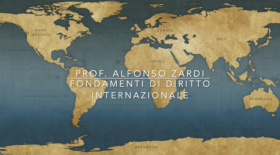Bringing high school students closer to geopolitics and international relations, this is the aim of the innovative project resulting from the memorandum of understanding (DGR. 1507/2023) between the Veneto Region, the Veneto Regional School Office and the M9 Foundation, with the collaboration operative of the magazine “Atlantis” and of Mazzanti Libri. This places Veneto as the first and only Italian region to achieve this objective. After last year's pilot experience, given the undoubted success, the project is now projected towards a three-year training period. Membership of the PCTO sees the participation of schools from all the provinces of Veneto, exceeding four hundred participants, including students and teachers.
The event on 27 February opened with institutional greetings from Serena Bertolucci, director of M9-Museo del '900; Marco Bussetti, director of the Regional School Office for the Veneto, and Elena Donazzan, councilor for education of the Veneto Region.
Alfonso Zardi, doctor of law, former representative of the Council of Europe then held the lesson entitled "Foundations of International Law, International Organizations and the European Union", illustrating the panorama of relations between States and the normative assumptions of international law, with particular attention to interstate conventions and legal bodies present on the global scene.
This speech represented the last piece of the first part of the course, the objective of which is to provide basic conceptual tools on historical and legal dynamics and balances of the international scenario, completing the two previous appointments held by Ambassador Maurizio Melani on the foundations of the history of international relations and organizations.
The foundations of the first part of the course provided the students with the cognitive means to better understand the insights that will be the protagonists of the second tranche of modules, starting from March 5th. The next appointments will, in fact, see the collaboration of leading exponents of the information, intelligence, energy, defense sectors, as well as the current geopolitical scenario.
The PCTO training course will end with participation in the International Festival of European Geopolitics 2024, on 9-10-11 May at M9 – Museo del '900 in Mestre Venice, during which students will be able to test themselves with press office assignments and listen to the important speakers who will speak, bringing together various expertise, in order to frame the influences with global geopolitical balances.







